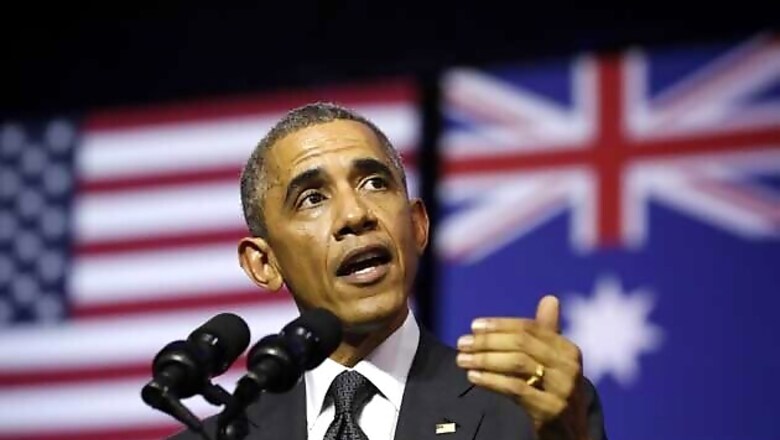
views
Brisbane: US President Barack Obama sought on Saturday to reassure Asia-Pacific allies about Washington's strategic shift toward the region as he sent a veiled message to a rising China with a vow to "deepen our engagement using every element of our power".
Speaking in Australia on the final stop of a three-country regional tour, Obama insisted that Asia's security order must not be based on "coercion or intimidation... where big nations bully the small, but on alliances for mutual security".
Although Obama did not explicitly point the finger at China, there was little doubt that he was alluding to Beijing's maritime disputes with its neighbors and growing concern in the region about its military build-up.
"No one should ever question our resolve or our commitments to our allies," Obama said in a policy speech at Queensland University in Brisbane, where he is attending a G20 summit.
Obama, who visited Beijing for an Asia-Pacific summit this week and held talks with President Xi Jinping, sought to show renewed resolve to follow through on his much-touted "pivot" to the region, involving military, diplomatic and economic assets.
The policy is widely seen as intended to counter China's rising influence, although Obama, at a news conference with Xi earlier in the week, denied there was any desire to contain Beijing.
The Obama administration has billed the pivot to the region as a centerpiece of its foreign policy since it was announced in his first term.
But many in Asia are looking for further proof that the policy is real, especially with Obama's agenda dominated by crises ranging from the battle against Islamic State militants and the conflict in Ukraine to the spread of Ebola.
Obama made clear that in addition to security, Washington was determined to expand trade, a goal underscored by efforts to forge a trans-Pacific trade partnership in difficult negotiations that so far exclude China.
But even as Obama hailed the region's "dynamism," he warned of potential threats.
"We see dangers that could undermine this progress," he said, citing North Korea's nuclear and missile programs, disputes over territory that threaten to spiral into confrontation and the failure to uphold universal human rights.
Obama also used his speech to formally announce a $3 billion US contribution to an international fund to help poor countries cope with the effects of climate change.
Obama's challenge now, with just two years left in his presidency, is to overcome scepticism about whether his administration can fully engage while it is preoccupied with problems elsewhere.




















Comments
0 comment